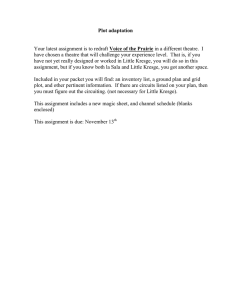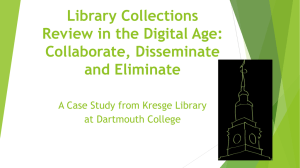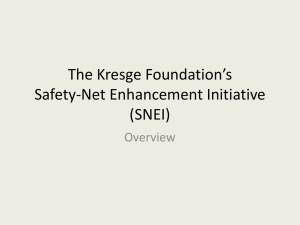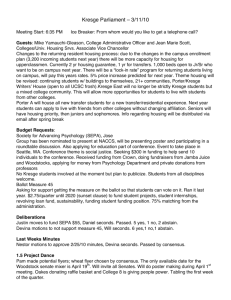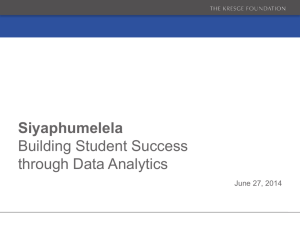Fresh, Local and Equitable
advertisement
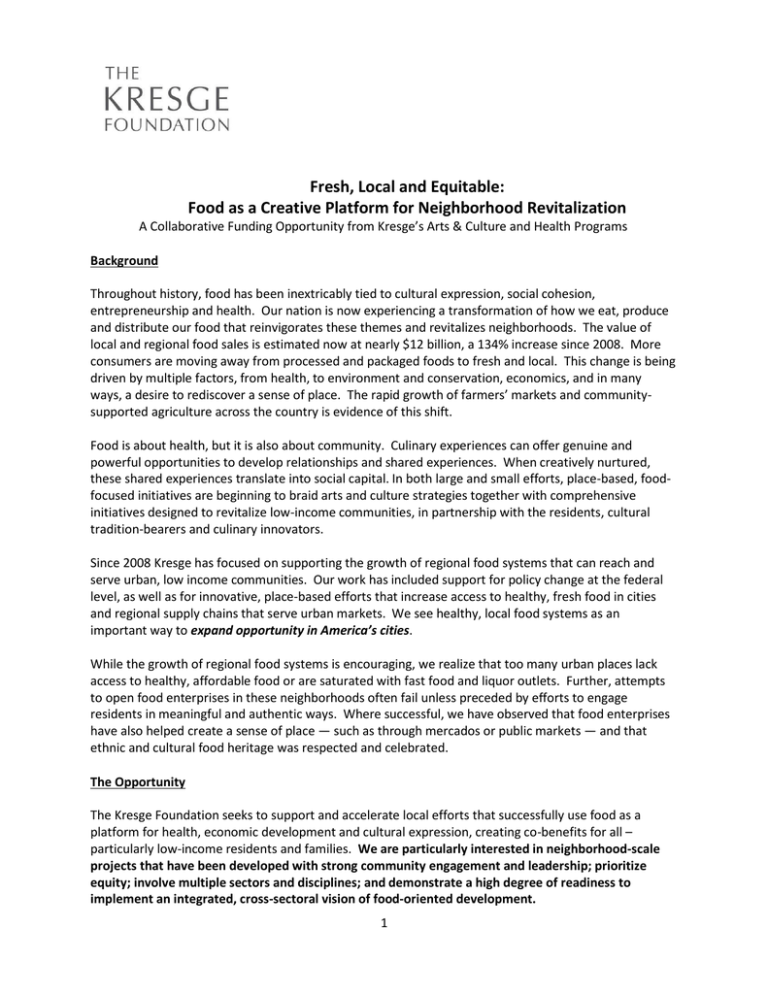
Fresh, Local and Equitable: Food as a Creative Platform for Neighborhood Revitalization A Collaborative Funding Opportunity from Kresge’s Arts & Culture and Health Programs Background Throughout history, food has been inextricably tied to cultural expression, social cohesion, entrepreneurship and health. Our nation is now experiencing a transformation of how we eat, produce and distribute our food that reinvigorates these themes and revitalizes neighborhoods. The value of local and regional food sales is estimated now at nearly $12 billion, a 134% increase since 2008. More consumers are moving away from processed and packaged foods to fresh and local. This change is being driven by multiple factors, from health, to environment and conservation, economics, and in many ways, a desire to rediscover a sense of place. The rapid growth of farmers’ markets and communitysupported agriculture across the country is evidence of this shift. Food is about health, but it is also about community. Culinary experiences can offer genuine and powerful opportunities to develop relationships and shared experiences. When creatively nurtured, these shared experiences translate into social capital. In both large and small efforts, place-based, foodfocused initiatives are beginning to braid arts and culture strategies together with comprehensive initiatives designed to revitalize low-income communities, in partnership with the residents, cultural tradition-bearers and culinary innovators. Since 2008 Kresge has focused on supporting the growth of regional food systems that can reach and serve urban, low income communities. Our work has included support for policy change at the federal level, as well as for innovative, place-based efforts that increase access to healthy, fresh food in cities and regional supply chains that serve urban markets. We see healthy, local food systems as an important way to expand opportunity in America’s cities. While the growth of regional food systems is encouraging, we realize that too many urban places lack access to healthy, affordable food or are saturated with fast food and liquor outlets. Further, attempts to open food enterprises in these neighborhoods often fail unless preceded by efforts to engage residents in meaningful and authentic ways. Where successful, we have observed that food enterprises have also helped create a sense of place — such as through mercados or public markets — and that ethnic and cultural food heritage was respected and celebrated. The Opportunity The Kresge Foundation seeks to support and accelerate local efforts that successfully use food as a platform for health, economic development and cultural expression, creating co-benefits for all – particularly low-income residents and families. We are particularly interested in neighborhood-scale projects that have been developed with strong community engagement and leadership; prioritize equity; involve multiple sectors and disciplines; and demonstrate a high degree of readiness to implement an integrated, cross-sectoral vision of food-oriented development. 1 This funding opportunity represents a collaborative effort between Kresge’s Arts & Culture and Health Programs. Kresge’s Arts & Culture Program seeks to help build strong, healthy cities by promoting the integration of arts and culture in community revitalization. We work across sectors with organizations committed to creating opportunities for low-income and underrepresented people and tapping the power of arts and culture to re-energize communities. Kresge’s Health Program works to enable communities to overcome economic, environmental and social barriers to health. Our work focuses both on “upstream” determinants of health such as housing, food systems and transportation, as well as on innovative partnerships that share resources and responsibilities between health systems, public health and a range of community partners to improve population health. This funding opportunity aims to surface and accelerate the most promising initiatives that use foodoriented development as a comprehensive community revitalization strategy. Kresge aims to help leading-edge community food initiatives demonstrate their value and deliver multiple benefits in partnership with low-income residents. Kresge invites proposals from organizations and collaborations leading mission-driven food initiatives in economically distressed urban neighborhoods. Kresge intends to award up to 20 planning grants of up to $75,000 each in the first quarter of 2016. Planning grants can last up to 12 months, and awardees will have the opportunity to apply for implementation funding, although earning a planning award does not guarantee earning implementation funding. We expect all grantees to actively participate in a learning community, share their challenges and successes, and contribute to development of a national field of practice. Competitive proposals will address the following core criteria: Creative Place-Making: How will the proposed project use creativity (e.g., art, culture, design) to promote cultural heritage, animate public and private spaces, rejuvenate structures and streetscapes, improve local business viability and public safety, and bring diverse people together? Health: How will the proposed project improve access to healthy, affordable food within lowincome communities and build social cohesion? Economic Development: How will the proposed project create living-wage jobs, expand microenterprise development, promote enterprise-level training, and contribute to neighborhood revitalization? Equity: How will the proposed project expand opportunities for everyone to participate and prosper, particularly those communities that have historically been excluded from such opportunities? Kresge invites proposals from collaborative, multi-sector initiatives that embrace this integrated view of food-oriented development, including those that may be strong in most of these dimensions and demonstrate a commitment to grow into others during the planning phase. If you believe that your work matches these objectives, we invite you to apply here. If you are a first-time applicant to Kresge, please review our online guide here. 2 Grants made through this program can support project management, partnership development, community engagement, strategic communications, evaluation, policy development and other activities directly related to the success of the initiative. Grants cannot cover capital construction costs, real estate acquisition or the purchase of major equipment. We expect all organizations earning a planning grant to complete a well-defined implementation plan before the end of their grants, including goals, strategies, a resource development plan, and a clear description of the roles and responsibilities of all partners. We are asking parties interested in applying for funding to answer the following questions: 1. Please describe the neighborhood or community that is the focus of your project, including its demographics, history, challenges, assets and aspirations. 2. What is the current state of your food-oriented development plan, and its role in neighborhood revitalization? 3. How have you engaged your community thus far, including the involvement of local residents and the representation of organizations from different sectors? 4. How will you use a planning grant to further define your strategies, involve local residents, engage new partners, and prepare to implement an initiative that incorporates the core criteria listed above? 5. Please describe any complementary efforts in your community, city or region that have the potential to enhance the impact of your project. 6. Please describe your current financing strategy (we recognize that this strategy may evolve during the term of the planning grant, but please share your current estimate of the potential sources and uses of funding that will eventually be necessary). 7. What outcomes do you intend to achieve by the end of the planning grant? 8. What challenges do you anticipate encountering, and what is your strategy to mitigate them? 9. What type of technical assistance would be most valuable to building the capacity of your partnership during the course of the planning grant? The answer to this question will inform our technical assistance strategies, and will not affect the review of your proposal. In addition to the proposal narrative upload a project budget, at least three letters of commitment from key partners and the most recent audited financial statements from the lead applicant. Complete proposals are due by 5:00 p.m. EST on January 15, 2016. In order to learn more about this funding opportunity, we invite you to join our webinar on December 7, 2015 at 1:00 pm EST. You may register for the webinar here. We also strongly encourage you to read our Frequently Asked Questions document. 3
